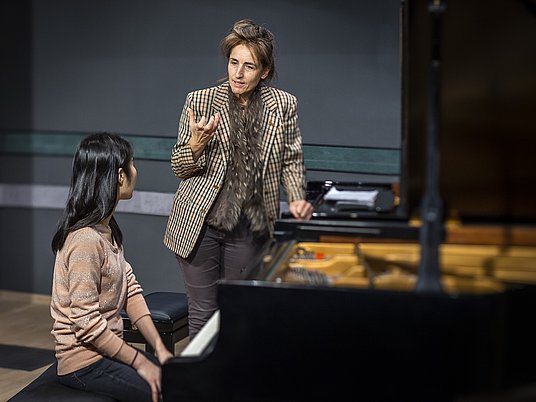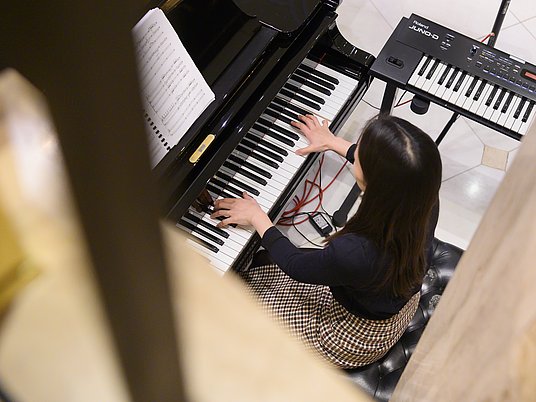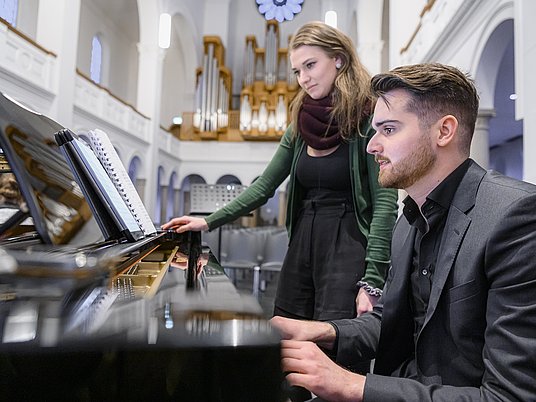Bachelor of Music -
Piano
Find all colors in black and white keys.
The four-year Bachelor of Music degree program in piano enables its graduates to find a place in a professional field that offers a wide range of opportunities and that matches their specific talents.
We place great emphasis on the training of a complete musical personality. To this end, our curriculum includes Historically Informed Interpretive Practice and New Music, sight-reading and improvisation, embodiment, and musician's medicine. In addition, the program is flanked by courses in music theory and music history. Essential contents are chamber music and song composition for pianists. The basics are also taught in the field of didactics.
If you have any questions about the study program, please contact the responsible person(s).
Basic information
| Degree | Bachelor of Music |
|---|---|
| Period of study | 8 Semester |
| Course begin | Wintersemester |
| ECTS points | 240 Credits |
| Major subjects | Klavier |
| Continuing study options | Master of Music Interpretation New Music, Master of Music Chamber Music, Master of Music Piano, Master of Music Song Interpretation for Pianists, Master of Music Modern Piano Music |
Additional information
After the first two years of study, students have the opportunity to choose between two study profiles:
- Solo/Chamber Music Profile
- Profile Instrumental Pedagogy
Graduation from the program consists of a public artistic-practical examination with a written component, as well as other examinations related to the chosen profile.
Further study options: Master of Music Solo / Chamber Music, Master of Music Chamber Music for Fixed Ensemble, Master of Music New Piano Music, Master of Music Lied Interpretation (Piano), Master of Music Interpretation New Music, Master Fortepiano 18th and 19th Century Concert Exam Piano.
Special features of the study
At the Cologne University of Music and Dance, you can expect not only 187 Steinway grand pianos intended for teaching or your exercises, but also our collection of 19th century keyboard instruments. Historical instruments by famous piano makers such as Pleyel, Erard, Broadwood or Conrad Graf are available for occasional lessons. They thus allow an authentic examination of 19th century works. If interested, there is also the possibility for historically inspired artistic exchange with our Institute for Historically Informed Interpretive Practice.
Application and aptitude test
Applications are submitted online via the muvac platform. All information on the procedure can be found on our application page.
Admission requirements
- General university entrance qualification or a comparable university entrance qualification
- Proof of a TestDaF 3 language certificate for non-German-speaking applicants
- Successfully passed aptitude test
Qualifying examination
The aptitude test consists of the following two parts:
- Artistic-practical examination in the main subject (duration: approx. 15 minutes)
- Music theory (elementary composition/aural training) (written exams, duration together approx. 90 minutes)
Detailed information can be found in the Qualifying Examination Regulations, especially in the appendix for content requirements and conduct of the examination.
We recommend that you contact the major subject teacher of your choice in good time. They will be happy to advise you personally.
Course of studies and examination regulations
The program is divided into a basic study period (1st and 2nd year) with a high proportion of compulsory modules and a differentiated main study period (3rd and 4th year).
The structural framework is formed by 6 main modules and the 7th profile-forming module:
- Core module
- Artistic-practical context
- Education
- Mediation
- Professionalization
- Bachelor thesis / Interdisciplinary project
- Profile Solo/Chamber Music or Profile Instrumental Pedagogy
Teachers
Klavier
Klavier / Kammermusik
Klavier, Improvisation
Klavier, Korrepetition
Klavier, Korrepetition, Klavierkammermusik
Klavierauszugsspiel
Klavierkammermusik
Korrepetition Klavier
Neue Klaviermusik
Videos about the study program
- Beethoven Off
- Clavier Night. 2017 Trailer
- EchoSpore, rediscovery of works by persecuted composers
- Students of the piano class of Prof. Andreas Frölich |
- Students from the class of Prof. Dr. Florence Millet
- Students from the class of Prof. Sheila Arnold
- Do you know Beethoven? (episode 1-6)
- Jeongro Park
- You can also find more videos on the YouTube channel of HfMT Cologne.
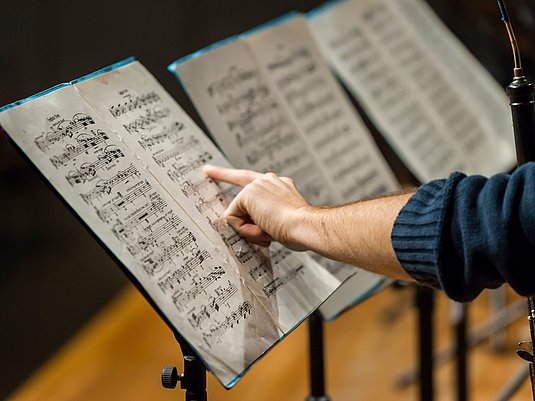
Contact
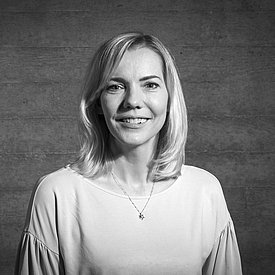
|
gesa.luecker@hfmt-koeln.de |
|
| Address |
Hochschule für Musik und Tanz Köln Unter Krahnenbäumen 87 50668 Köln |


